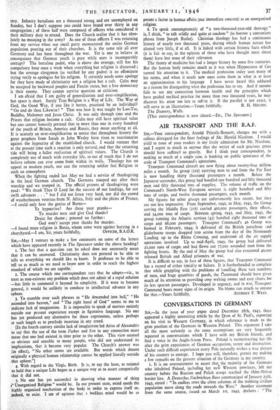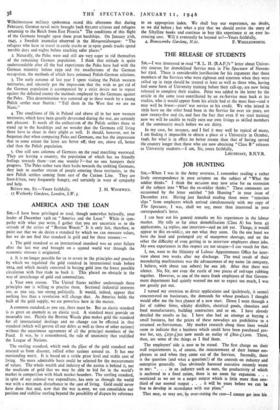CONVERSATIONS IN GERMANY
Sta,—In the issue of your paper dated December 28th, 1945, there appeared a highly interesting article by the pearl of St. Paul's, reporting on his visit to Western Germany, in which teference is made to the grim position of the Germans in Western Poland. This argument I take all the more seriously as the same assumptions are very frequently repeated in conversations which I have with my British friends, and find a voice in the Anglo-Saxon Press. Poland is reconstructing her life after the grim experiences of German occupation, terror and destruction. Under such difficult experiences every Pole naturally wishes a true picture of his country to emetge. I hope you will, therefore, permit my making a few remarks on the present situation of the Germans in my country.
i. It is no overstatement to assert that the majority of the Germans who inhabited Poland, including her new Western provinces, left my country before the Russian and Polish troops reached the Oder-Neisse border line. A Deutsches Nachrichten Buro communiqué of January 25th, 1945, stated : "In endless rows the silent columns of the trekking civilian population move along the roads towards the West." Another statement from the same source, issued on March 1st, 1945, declares : "The
Wilhelmstrasse military spokesman stated this afternoon that during February, German naval units brought back 651,000 citizens and refugees returning to the Reich from East Prussia." The conditions of this flight of the Germans brought upon them great hardships. On January 27da, 1945, a Swedish journalist observed in the Morgentidntngen: "The refugees who have to travel in cattle trucks or in open goods truck's spend terrible days and nights before reaching safer places."
2. Naturally, the Poles were and still are very eager to rid themselves of the remaining German population. I think that attitude is quite understandable after all the bad experiences the Poles have had with the German minority before 1939 and the recollections of the German occupation, the methods of which have poisoned Polish-German relations.
3. The early autumn of last year I spent visiting the Polish western territories, and sincerely got the impression that the wish to get rid of the German population is accompanied by a strict desire not to repeat against the defeated enemy the methods employed by the Germans against the Poles. This determination was summed up in these words by a young Polish settler near Stettin: "Tell them in the West that we are no Nazis."
4. The conditions of life in Poland and above all in her new western territories, which have been greatly devastated during the war, are certainly not pleasant. It needs all the enthusiasm of the Polish settlers there to stand up to the hardships and no wonder that the Germans still living there have to share in their plight as well. It should, however, not be forgotten that when comparing Poles and Germans, one has the impression that to some extent the latter are better off; they are, above all, better clad than the Polish population.
5. One still sees columns of Germans on the road marching westward. They are leaving a country, the population of which has no friendly feelings towards them—can one wonder ?—but no one hampers their progress. The Poles rather turn their backs towards the trekking Germans, they look to another stream of people entering those territories, to the new Polish settlers coming from east of the Curzon Line. They are frost-b:tten, very frequently hungry, and certainly in want of sympathy and help.
Believe me, Sir.—Yours faithfully, J. M. WINIEWICZ. .i Wetherby Gardens, London, S.W. 5.































 Previous page
Previous page